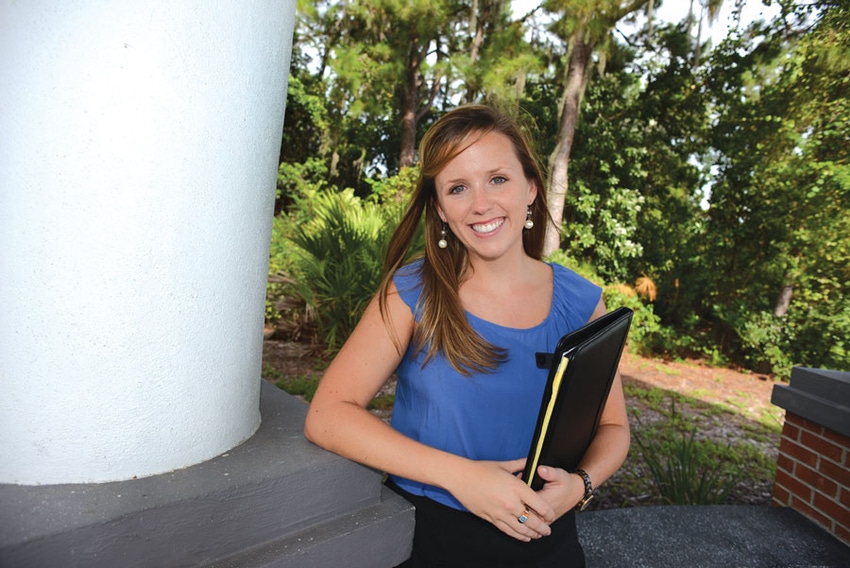September 20, 2012

Just when most of the talk from campuses revolves around budget cuts and reduced offerings, little Warner University pops up with a brand-new agriculture program.
The Lake Wales, Fla., school will enroll the first students this fall for its Bachelor of Arts in Agricultural Studies degree, with classes kicking off next fall.
With just 1,100 students and operated by the Church of God–Indiana, the move seems a bit unusual — which gets no argument from Lauren Lewis, the university’s director of agricultural studies.
“We think the traditional universities have been missing the boat on some students interested in ag, particularly the land-grant universities, by being so research-focused,” she says.
“For the student who wants to work hands-on in agriculture, it’s hard to get into those research opportunities without a very high grade point average. We’re here for students who want to work in agriculture, on farms and with agribusinesses. Some may want to go on to graduate school but we think a lot will want to go right to work after getting their degree here.”
Lewis, 24, a native of nearby Haines City, grew up in a cattle-raising family involved with trucking fruit, melons and vegetables. Throughout childhood, she was influenced by 4-H and FFA, and was a state vice president of FFA in 2006-2007.
She went on to graduate from Auburn University with a degree in agricultural business and economics, and an agricultural leadership studies minor. She got an M.S. in agricultural education at Texas A&M University, graduating this May.
Developing the Warner program in Lake Wales is her first post-college job.
“I have a passion for this,”she says. “I am very excited about it.” She notes that Warner is building greenhouses with hydroponics and other facilities on 15 acres of its campus.
Students will begin core agriculture courses as freshmen and are encouraged to minor in complementary programs like biology, business and communications, or even pre-law. From the start, the focus will be hands-on work.
“Adjunct professors will teach many of the courses,” Lewis says. “We are getting industry leaders to teach the classes.”
Every two weeks, students will go to area ag-related businesses and farms to see firsthand how they operate. In addition, they will intern with farms and businesses at least 45 hours each semester.
Practical program
“We’ve put together a practical program for students to get as much experience as possible,” Lewis says.
“We will sit down with students, learn their goals, and map out an internship and practicum for each one. We want students to see the entire picture of that aspect of agriculture.
“One semester they may be working with a farm, the next semester on the marketing side, and the next after that, with media.
“We’ve established a list of individuals and companies that will let them come in and intern, to give them a practical background so when they graduate they’ll be ready to go to work.”
Lewis thinks Warner ag graduates will be prepared to work in jobs as wide-ranging as the industry itself.
“This is definitely a broad-based program,” she says. “We’re finding that employers want employees who have a broad knowledge of many areas of agriculture.
“Our graduates will know something about a lot of things — agronomy, citrus production, ag mechanics, sustainability, and many other areas. We want to insure that our students know about all the components of agriculture.”
The university established an advisory council to help map out a program that potential employers, as well as students, would find most valuable.
“We’re bringing the entire ag sector together to help guide us,” she says.
Ag classes will start in August 2013. Students are already enrolled for the program, however, and will take a wide-ranging agriculture course this spring to teach them about global issues in the business.
“Since this is a church-related school, there is a missions component, too,” Lewis says. “We’re planning to go to Honduras that first year to teach people there how to grow food and diversify their food supply.
“This will be through the HEART (Hunger, Education and Resources Training) Institute located here on campus.
“We’re hoping to open their eyes to the world as freshmen, so they know the depth of this industry and understand that they’re not just in a little bubble here in central Florida. There are a lot of issues you can’t really understand until you’ve been there and seen it and talked to the people.”
Right now, Lewis stays busy explaining the new program to people throughout the area.
“I hope the ag industry will support us,” she says. “While we’re a private school, we’re still non-profit. We have to raise money for building facilities. We hope industry stakeholders will feel an investment with us is a good thing, in order to build this program.
“What we’re doing is supporting the future of Florida agriculture. I really believe a lot more young people would be working in ag right now if they had a different option for a college education.”
Warner University, started in 1968 as Warner Southern College, is fully accredited, Lewis says, and is looking to expand into other academic areas, as well as athletics.
“We think the agriculture program is going to be a great opportunity for the university and for students. I get calls every day from people wanting information about the program. We had a booth at the state FFA meeting and the feedback was amazing,” she says.
About the Author(s)
You May Also Like




